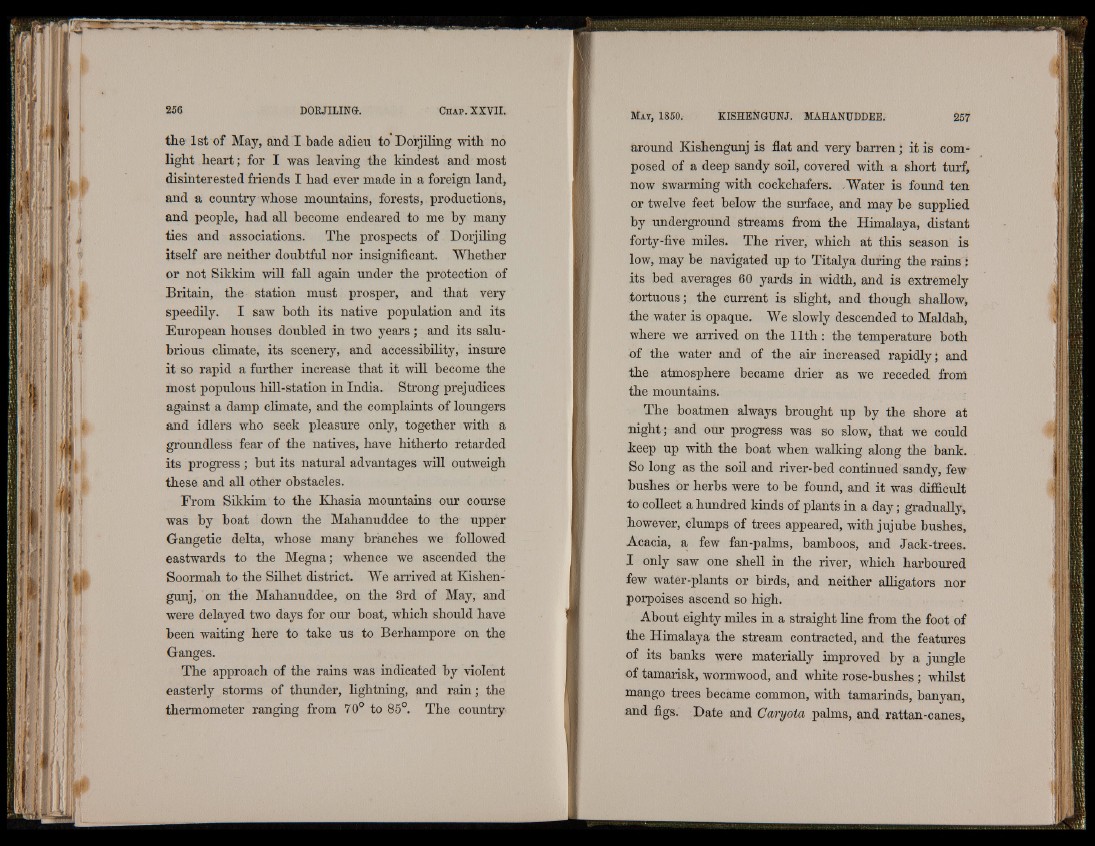
the 1st of May, and I bade adieu to Dorjiling with no
light heart; for I was leaving the kindest and most
disinterested friends I had ever made in a foreign land,
and a country whose mountains, forests, productions,
and people, had all become endeared to me by many
ties and associations. The prospects of Dorjiling
itself are neither doubtful nor insignificant. Whether
or not Sikkim will fall again under the protection of
Britain, the station must prosper, and that very
speedily. I saw both its native population and its
European houses doubled in two years ; and its salubrious
climate, its scenery, and accessibility, insure
it so rapid a further increase that it will become the
most populous bill-station in India. Strong prejudices
against a damp climate, and the complaints of loungers
and idlers who seek pleasure only, together with a
groundless fear of the natives, have hitherto retarded
its progress ; but its natural advantages will outweigh
these and all other obstacles.
From Sikkim to the Khasia mountains our course
was by boat down the Mahanuddee to the upper
Gangetic delta, whose many branches we followed
eastwards to the Megna; whence we ascended the
Soormah to the Silhet district. We arrived at Kishen-
gunj, on the Mahanuddee, on the 3rd of May, and
were delayed two days for our boat, which should have
been waiting here to take us to Berhampore on the
Ganges.
The approach of the rains was indicated by violent
easterly storms of thunder, lightning, and rain ; the
thermometer ranging from 70° to 85°. The country
around Kishengunj is flat and very barren; it is composed
of a deep sandy soil, covered with a short turf,
now swarming with cockchafers. .Water is found ten
or twelve feet below the surface, and may be supplied
by underground streams from the Himalaya, distant
forty-five miles. The river, which at this season is
low, may be navigated up to Titalya during the rains :
its bed averages 60 yards in width, and is extremely
tortuous; the current is slight, and though shallow,
the water is opaque. We slowly descended to Maldah,
where we arrived on the 1 1 th : the temperature both
of the water and of the air increased rapidly; and
the atmosphere became drier as we receded from
the mountains.
The boatmen always brought up by the shore at
night; and our progress was so slow, that we could
keep up with the boat when walking along the bank.
So long as the soil and river-bed continued sandy, few
bushes or herbs were to be found, and it was difficult
to collect a hundred kinds of plants in a day; gradually,
however, clumps of trees appeared, with jujube bushes,
Acacia, a few fan-palms, bamboos, and Jack-trees.
I only saw one shell in the river, which harboured
few water-plants or birds, and neither alligators nor
porpoises ascend so high.
About eighty miles in a straight line from the foot of
the Himalaya the stream contracted, and the features
of its banks were materially improved by a jungle
of tamarisk, wormwood, and white rose-bushes; whilst
mango trees became common, with tamarinds, banyan,
and figs. Date and Caryota palms, and rattan-canes,